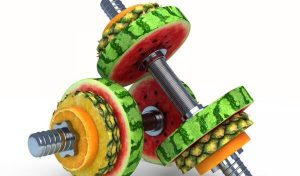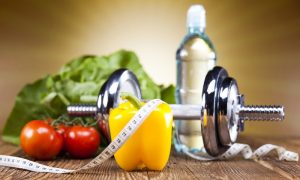Sports nutrition has long been widespread in the US, Western European and other markets. To us, sports nutrition “came” relatively recently, so many athletes, especially beginners do not fully understand, or do not understand what it is. Moreover, some argue that all this is “chemistry”, steroids, etc. Immediately make a reservation and say that you should not listen to stupidity, you need to figure out what sports nutrition is and decide whether you need it or not.
Sports nutrition: what is it?
 As it is banal, but sports nutrition, “grew” from dietary and children’s nutrition, food additives used in medicine, etc. Once again I repeat – it’s not “chemistry” and not steroids. As a rule, sports nutrition is produced from natural food components, in order to obtain environmentally friendly, easily assimilable concentrates of certain substances that help our body to recover faster and more efficiently after training, reach athletes’ goals, and build quality muscle mass to bodybuilders.
As it is banal, but sports nutrition, “grew” from dietary and children’s nutrition, food additives used in medicine, etc. Once again I repeat – it’s not “chemistry” and not steroids. As a rule, sports nutrition is produced from natural food components, in order to obtain environmentally friendly, easily assimilable concentrates of certain substances that help our body to recover faster and more efficiently after training, reach athletes’ goals, and build quality muscle mass to bodybuilders.
Sports nutrition. What is sports nutrition
In the left menu of my site is a detailed classification of modern sports nutrition, which describes the specific procedures for obtaining, each food supplement. There are also methods of use and a detailed description.
Modern sport is a whole industry that brings multimillion profits, and sports nutrition is one of its branches. However, despite the commercial side of the issue, sports nutrition really works and brings positive results to both professional athletes and amateurs.
Sports nutrition: to be or not to be?
Of course, to accept or not to accept is a very individual matter. We note only the positive and, possibly, the negative aspects of the question.
So, the body of an athlete, especially a bodybuilder, undergoes serious tests in training, and in order to fully recover for the next exercise, you need to supply him with the necessary amount of nutrients (proteins, carbohydrates, fats), vitamins and minerals, calories, which, alas, from ordinary food is almost impossible, especially since the ration of an amateur athlete, often, is far from ideal. I already said that with intensive training you need 3000-5000 calories per day, and some 6000 kcal. Think about these figures, how can you get them with ordinary food.
The truth about sports nutrition. Whether to take sports nutrition
 Sports nutrition, namely protein, carbohydrate and carbohydrate-protein mixtures in rational doses is a source of high-quality nutrients and additional calories. And such nutritional supplements as amino acids, creatine, vitamins, minerals, etc. – a means to improve efficiency, endurance, strength, optimal growth of muscles and the whole body.
Sports nutrition, namely protein, carbohydrate and carbohydrate-protein mixtures in rational doses is a source of high-quality nutrients and additional calories. And such nutritional supplements as amino acids, creatine, vitamins, minerals, etc. – a means to improve efficiency, endurance, strength, optimal growth of muscles and the whole body.
Remember, high-intensity loads require adequate recovery and sports nutrition is designed specifically for these purposes. If you are exhausted in training, after which you can not recover normally, at some particular stage your progress will stop. Moreover, if you eat poorly, the constant overload can lead to a number of diseases, think about it today, because tomorrow may be too late.
According to the results of modern research, under heavy loads, an athlete needs 2-4 g of protein per kilogram of body weight. Do you think it is possible to get so much from ordinary food? Theoretically yes, but, in fact, you physically can not eat so much, and the protein contained, for example, in chicken, is assimilated in our body by only 60%. And this is just an example of proteins, an analogy can be drawn with carbohydrates, creatine vitamins and other substances. So sports nutrition can meet the needs of your body in all the substances necessary for its recovery and growth. In addition, sports nutrition, unlike regular food, contains a minimum of fat, which is especially important for bodybuilders and people suffering from excessive weight. Also, there are special components that promote better absorption of nutrients in the body.
In short, sports nutrition has become an indispensable element of the diet of modern athletes. Many claim that sports nutrition is harmful, but it is more likely from a global misunderstanding of the issue. Note, as they say, usually, people who never used it or do not engage in sports at all. Blame for everything – the lack of necessary information. Meanwhile, the vast majority of athletes achieve significant results, including dietary supplements in their diet.
But there is also a fly in the ointment in the ointment. Sports nutrition – big business and many manufacturers, and their competitors are not clean on hand, so it is very important to carefully choose the choice of additives, because fakes and low-quality goods – the global problem of the modern market.
Clean Sport Nutrition 101: Intro to the Guiding Principles of Sport Nutrition
Sports nutrition: personal experience
In order not to be unfounded, I will bring a couple of facts from my own practice. A few years ago, I first asked myself: what is sports nutrition? Initially, my attitude was somewhat skeptical, but common sense and the necessary information helped to make a choice. I will not name specific manufacturers and paint my results, I will only note that the difference was obvious. In the future, I have become increasingly, as far as financial opportunities, include sports nutrition in your diet, which allows me to maintain adequate recovery processes in my body.
Whatever it was, to accept sports nutrition or not – the question is purely individual and you yourself are able to make this choice, and my site is designed to provide you with the necessary information. I note that sports nutrition is a supplement to your usual diet, but not its substitute, in itself it will not bring the desired results, so do not think that this is a panacea.
In conclusion, I will once again emphasize that the quality sports nutrition of proven brands really works. Of course, one can not say 100% that there are no harmful components there, but with the same success, one can also discuss the products of our daily diet, which are far from ideal in composition.